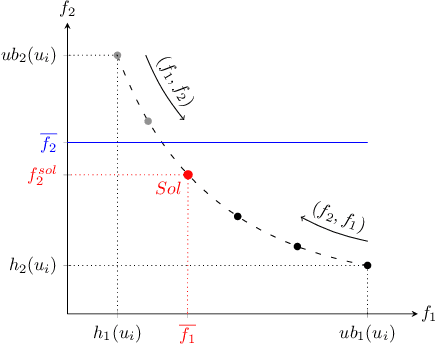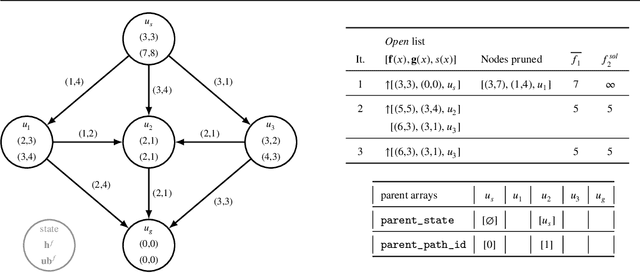Saman Ahmadi
Resource Constrained Pathfinding with A* and Negative Weights
Mar 14, 2025Abstract:Constrained pathfinding is a well-studied, yet challenging network optimisation problem that can be seen in a broad range of real-world applications. Pathfinding with multiple resource limits, which is known as the Resource Constrained Shortest Path Problem (RCSP), aims to plan a cost-optimum path subject to limited usage of resources. Given the recent advances in constrained and multi-criteria search with A*, this paper introduces a new resource constrained search framework on the basis of A* to tackle RCSP in large networks, even in the presence of negative cost and negative resources. We empirically evaluate our new algorithm on a set of large instances and show up to two orders of magnitude faster performance compared to state-of-the-art RCSP algorithms in the literature.
Parallelizing Multi-objective A* Search
Mar 13, 2025Abstract:The Multi-objective Shortest Path (MOSP) problem is a classic network optimization problem that aims to find all Pareto-optimal paths between two points in a graph with multiple edge costs. Recent studies on multi-objective search with A* (MOA*) have demonstrated superior performance in solving difficult MOSP instances. This paper presents a novel search framework that allows efficient parallelization of MOA* with different objective orders. The framework incorporates a unique upper bounding strategy that helps the search reduce the problem's dimensionality to one in certain cases. Experimental results demonstrate that the proposed framework can enhance the performance of recent A*-based solutions, with the speed-up proportional to the problem dimension.
Resource Constrained Pathfinding with Enhanced Bidirectional A* Search
Dec 18, 2024Abstract:The classic Resource Constrained Shortest Path (RCSP) problem aims to find a cost optimal path between a pair of nodes in a network such that the resources used in the path are within a given limit. Having been studied for over a decade, RCSP has seen recent solutions that utilize heuristic-guided search to solve the constrained problem faster. Building upon the bidirectional A* search paradigm, this research introduces a novel constrained search framework that uses efficient pruning strategies to allow for accelerated and effective RCSP search in large-scale networks. Results show that, compared to the state of the art, our enhanced framework can significantly reduce the constrained search time, achieving speed-ups of over to two orders of magnitude.
Real-Time Energy-Optimal Path Planning for Electric Vehicles
Nov 20, 2024Abstract:The rapid adoption of electric vehicles (EVs) in modern transport systems has made energy-aware routing a critical task in their successful integration, especially within large-scale networks. In cases where an EV's remaining energy is limited and charging locations are not easily accessible, some destinations may only be reachable through an energy-optimal path: a route that consumes less energy than all other alternatives. The feasibility of such energy-efficient paths depends heavily on the accuracy of the energy model used for planning, and thus failing to account for vehicle dynamics can lead to inaccurate energy estimates, rendering some planned routes infeasible in reality. This paper explores the impact of vehicle dynamics on energy-optimal path planning for EVs. We develop an accurate energy model that incorporates key vehicle dynamics parameters into energy calculations, thereby reducing the risk of planning infeasible paths under battery constraints. The paper also introduces two novel online reweighting functions that allow for a faster, pre-processing free, pathfinding in the presence of negative energy costs resulting from regenerative braking, making them ideal for real-time applications. Through extensive experimentation on real-world transport networks, we demonstrate that our approach considerably enhances energy-optimal pathfinding for EVs in both computational efficiency and energy estimation accuracy.
Enhanced Methods for the Weight Constrained Shortest Path Problem: Constrained Path Finding Meets Bi-objective Search
Jul 29, 2022



Abstract:The classic problem of \textit{constrained path finding} is a well-studied but yet challenging topic in AI with a broad range of applications in various areas such communication and transportation. The Weight Constrained Shortest Path Problem (WCSPP), as the base form of constrained path finding with only one side constraint, aims to plan a cost optimum path whose weight/resource usage is limited. Given the bi-criteria nature of the problem (i.e., dealing with cost and weight of paths), methods addressing the WCSPP have some common properties with bi-objective search. This paper leverages the recent state-of-the-art A*-based techniques in both constrained path finding and bi-objective search and presents two exact solution approaches to the WCSPP, both capable of solving hard problem instances on very large graphs. We empirically evaluate the performance of our algorithms on a new set of large and realistic problem instances and show their advantages over the state-of-the-art algorithms in both time and space metrics. This paper also investigates the importance of priority queues in constrained search with A*. We show with extensive experiments on both realistic and randomised graphs how bucket-based queues without tie-breaking can effectively improve the algorithmic performance of exhaustive bi-criteria searches.
Bi-objective Search with Bi-directional A*
May 25, 2021



Abstract:Bi-objective search is a well-known algorithmic problem, concerned with finding a set of optimal solutions in a two-dimensional domain. This problem has a wide variety of applications such as planning in transport systems or optimal control in energy systems. Recently, bi-objective A*-based search (BOA*) has shown state-of-the-art performance in large networks. This paper develops a bi-directional variant of BOA*, enriched with several speed-up heuristics. Our experimental results on 1,000 benchmark cases show that our bi-directional A* algorithm for bi-objective search (BOBA*) can optimally solve all of the benchmark cases within the time limit, outperforming the state of the art BOA*, bi-objective Dijkstra and bi-directional bi-objective Dijkstra by an average runtime improvement of a factor of five over all of the benchmark instances.
 Add to Chrome
Add to Chrome Add to Firefox
Add to Firefox Add to Edge
Add to Edge